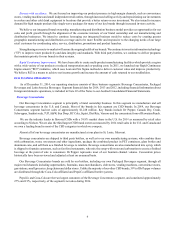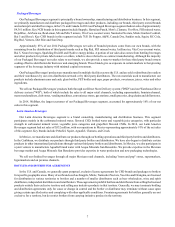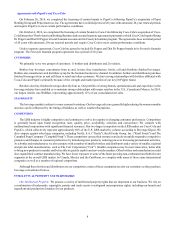Snapple 2014 Annual Report Download - page 19
Download and view the complete annual report
Please find page 19 of the 2014 Snapple annual report below. You can navigate through the pages in the report by either clicking on the pages listed below, or by using the keyword search tool below to find specific information within the annual report.
16
Substantial disruption to production at our manufacturing and distribution facilities could occur.
A disruption in production at our beverage concentrates manufacturing facility, which manufactures almost all of our
concentrates, could have a material adverse effect on our business. In addition, a disruption could occur at any of our other facilities
or those of our suppliers, bottlers or distributors. The disruption could occur for many reasons, including fire, natural disasters,
weather, water scarcity, manufacturing problems, disease, strikes, transportation or supply interruption, government regulation,
cybersecurity attacks or terrorism. Alternative facilities with sufficient capacity or capabilities may not be available, may cost
substantially more or may take a significant time to start production, each of which could negatively affect our business and
financial performance.
We may fail to comply with applicable government laws and regulations.
We are subject to a variety of federal, state and local laws and regulations in the U.S., Canada, Mexico and other countries
in which we do business. These laws and regulations apply to many aspects of our business including the manufacture, safety,
labeling, transportation, advertising and sale of our products. See "Regulatory Matters" in Item 1, "Business," of this Annual Report
on Form 10-K for more information regarding many of these laws and regulations.
Violations of these laws or regulations in the manufacture, safety, labeling, transportation and advertising of our products
could damage our reputation and/or result in regulatory actions with substantial penalties. In addition, any significant change in
such laws or regulations or their interpretation, or the introduction of higher standards or more stringent laws or regulations, could
result in increased compliance costs or capital expenditures. For example, changes in recycling and bottle deposit laws or special
taxes on soft drinks or ingredients could increase our costs. Regulatory focus on the health, safety and marketing of food products
is increasing. Certain federal or state regulations or laws affecting the labeling of our products, such as California's "Prop 65,"
which requires warnings on any product with substances that the state lists as potentially causing cancer or birth defects, are or
could become applicable to our products.
Weather, climate change legislation and the availability of water could adversely affect our business.
Unseasonable or unusual weather or long-term climate changes may negatively impact the price or availability of raw materials,
energy and fuel, and demand for our products. Unusually cool weather during the summer months may result in reduced demand
for our products and have a negative effect on our business and financial performance.
There is growing political and scientific sentiment that increased concentrations of carbon dioxide and other greenhouse gases
in the atmosphere are influencing global weather patterns ("global warming"). Concern over climate change, including global
warming, has led to legislative and regulatory initiatives directed at limiting greenhouse gas ("GHG") emissions. For example,
proposals that would impose mandatory requirements on GHG emissions continue to be considered by policy makers in the
countries in which we operate. Laws enacted that directly or indirectly affect our production, distribution, packaging, cost of raw
materials, fuel, ingredients and water could all negatively impact our business and financial results.
We also may be faced with water availability risks. Water is the main ingredient in substantially all of our products. Climate
change may cause water scarcity and a deterioration of water quality in areas where we maintain operations. The competition for
water among domestic, agricultural and manufacturing users is increasing in the countries where we operate, and as water becomes
scarcer or the quality of the water deteriorates, we may incur increased production costs or face manufacturing constraints which
could negatively affect our business and financial performance. Even where water is widely available, water purification and waste
treatment infrastructure limitations could increase costs or constrain our operations.
Our products may not meet health and safety standards or could become contaminated.
We have adopted various quality, environmental, health and safety standards. However, our products may still not meet these
standards or could otherwise become contaminated. A failure to meet these standards or contamination could occur in our operations
or those of our bottlers, distributors or suppliers. This could result in expensive production interruptions, recalls, liability claims
and negative publicity. Moreover, negative publicity also could be generated from false, unfounded or nominal liability claims or
limited recalls. Any of these failures or occurrences could negatively affect our business and financial performance.
























